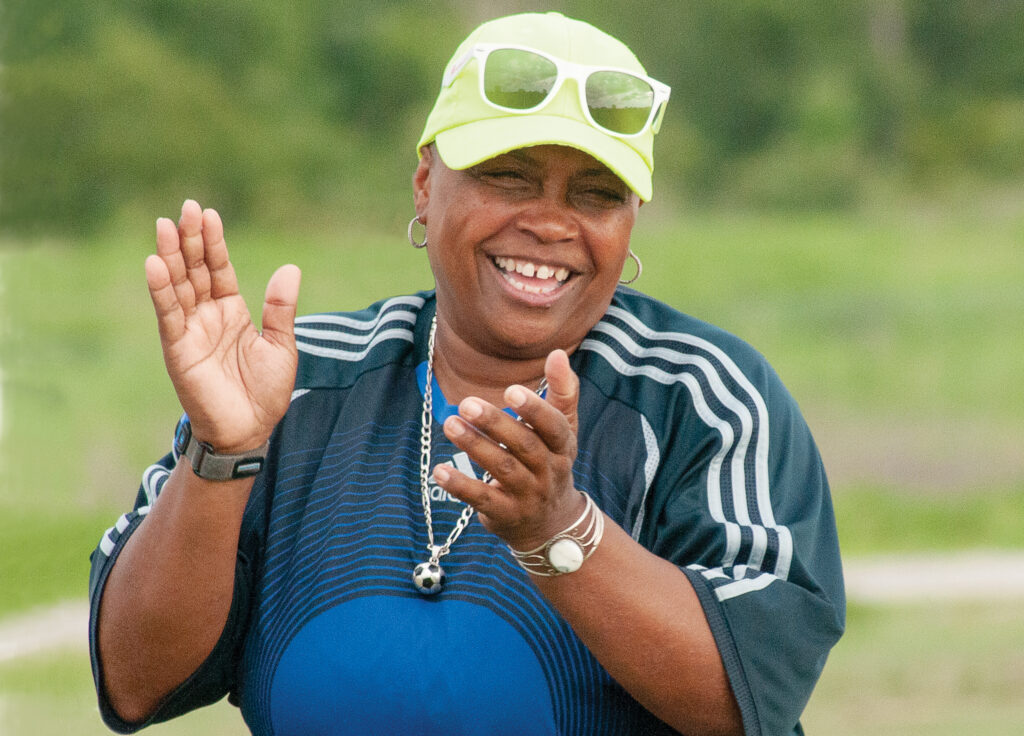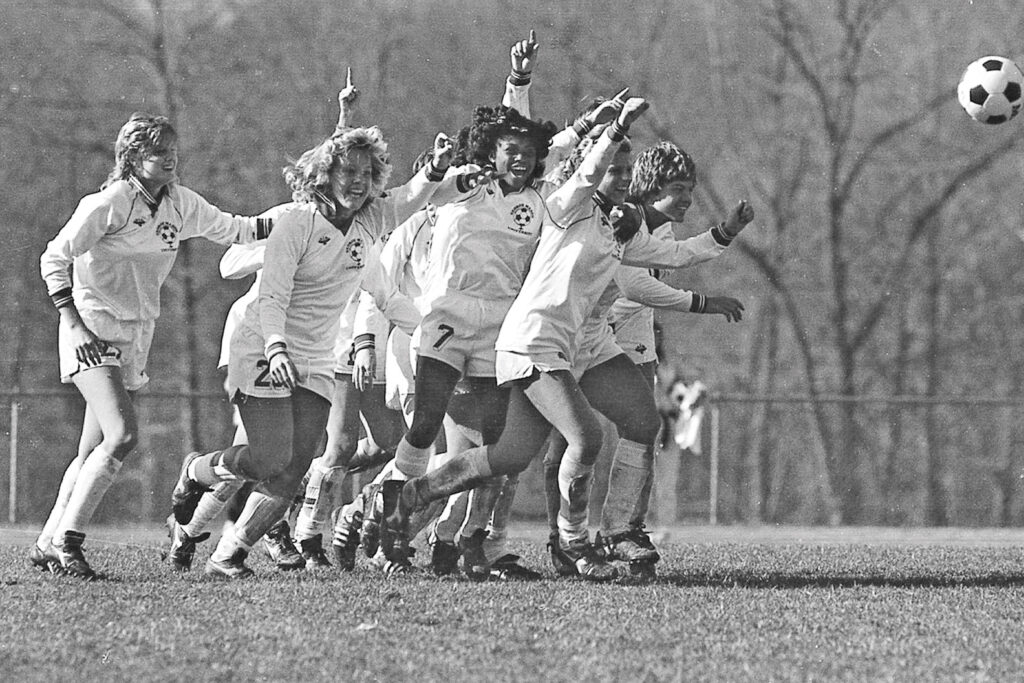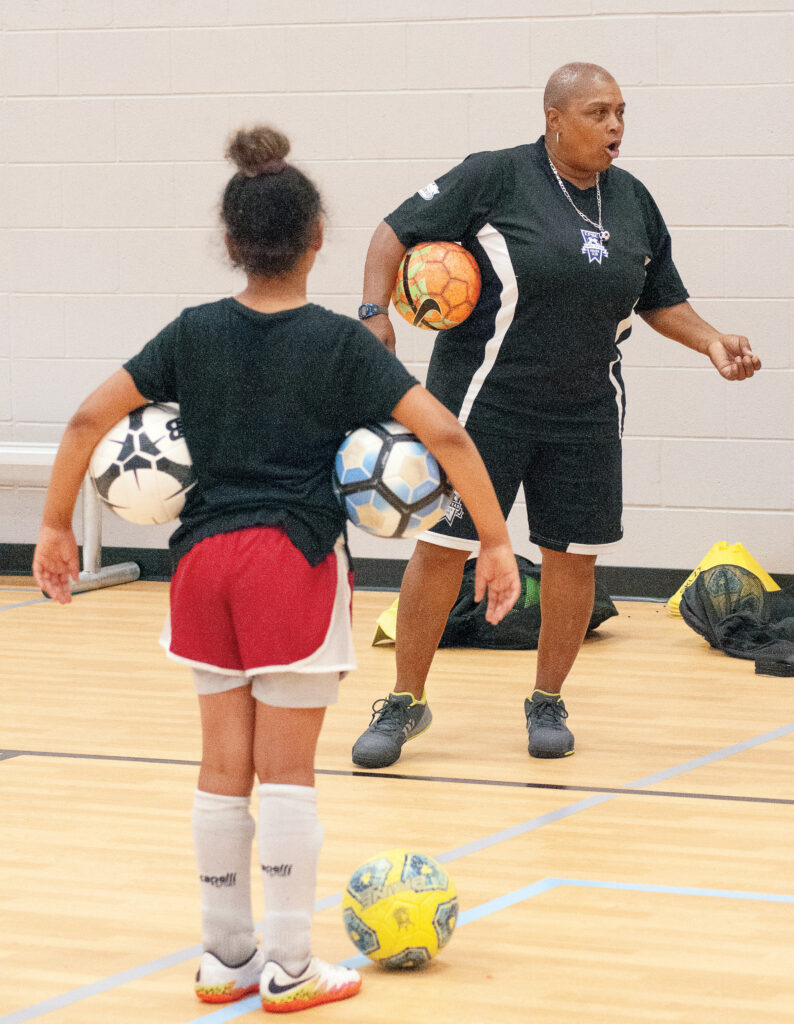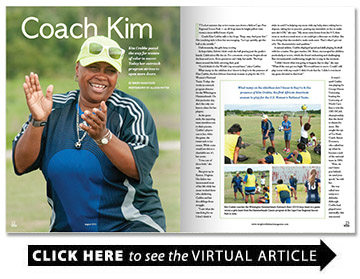Coach Kim
Kim Crabbe paved the way for women of color in soccer. Today her outreach program strives to open more doors.
BY Emory Rakestraw

It’s a hot summer day as two teams race down a field at Cape Fear Regional Soccer Park — an all-boys community outreach team in bright yellow vests versus a classic-level team of Wilmington Hammerheads Youth FC girls.
Coach Kim Crabbe calls to her boys, “Easy, easy, find your feet.” Her coaching style is firm but encouraging. “Let’s go quickly, get the ball to the middle.”
As the game wanes, Edwin’s kick sends the ball grazing past the goalie’s hands, giving the Outreach Starz their first goal. Celebrations fill the air. For a moment, everyone forgets about the heat and score. Even spectators can’t help but smile. The boys dance around the field, savoring their goal.
“You’d think it’s the World Cup around here,” jokes Crabbe.
What many on the sidelines don’t know is they’re in the presence of Kim Crabbe, the first African-American woman to play for the U.S. Women’s National Team. Today, she works as outreach program director for the Wilmington Hammerheads.
As the game ends, Crabbe’s players run to her. Her team might have been outscored, but it doesn’t matter. Each player receives words of praise and encouragement. After the game, she treats them to ice cream. While some would see this as going above and beyond, it’s her norm.
“I can relate to these kids as I was like them in many ways,” she says.
She grew up in Reston, Virginia, a suburban community 25 minutes outside of Washington, D.C., when soccer was gaining in popularity. Her mom, a single parent, worked three jobs, sheltering Crabbe and her two siblings from struggle.
“I saw what my mom was doing for us and how hard she worked, so it was only natural as the eldest to want to assist and help our family however I could,” she says. “At times that could mean picking up my younger sister Kacey from daycare and having her attend my high school practices with me. I would see my mom come home from working her 9-to-5 job then head off to her part-time retail job or register people to vote. Looking back, I now better understand that she was merely doing what she needed to do to make ends meet. More importantly, she was instilling great values within myself and my siblings.”
A natural athlete, Crabbe displayed speed and skill playing neighborhood tackle football with her male cousins. Her gym teacher, Mr. Bryant, encouraged her abilities, particularly at soccer, which she found enchanting and challenging.

Crabbe excelled at the sport and went on to play for George Mason University. When she was a key player on the team that beat the University of North Carolina to win the 1985 NCAA championship, she began to dream for more. She caught the eye of Tar Heels coach Anson Dorrance, who called her up when he became coach of the national team in 1986.
Although Crabbe had played internationally, this was surreal.
“I was one of the fastest players in the game,” she says. “But I knew in my heart I deserved to be there. I had put in the work, just like all of my teammates.”
She traveled throughout the U.S., playing with her heart. When her time ended, she didn’t let her soccer career fade. She found new purpose.
At the start of each school year Crabbe shares informative flyers to advertise her free Outreach City Soccer League at several of the community’s “Back to School” backpack events.
“Kim found me the same way she found all of her kids. My kids came home with this flyer saying, ‘I want to play soccer.’ I’m like, I can’t afford soccer and my daughter says, ‘It’s free,’” says Chrissie Marshburn. “I was fascinated by this woman. She has wall-to-wall kids hanging onto each word. When we got our uniforms, I kept waiting for someone to say, ‘OK, it’s $20.’ We walked out with free everything.”
For seven weeks in the fall and spring, Outreach City Soccer League players gather at Maides Park on Saturdays. They start each session within a group warmup that coach Kim calls “ballnastics.” This involves all participants and coaches and assures that everyone is moving with a ball.
“Participants then move to their designated field where their volunteer coach offers another, short, structured drill,” Crabbe says. “And then we play! The beauty is that no one is excluded, but instead encouraged in a positive manner.”
Pre-pandemic, the number of signups hit 380. The league is more than Crabbe creating new champions. It’s having a tangible impact.

Photo by Allison Potter
Marshburn’s daughter, Ryliegh, now 9, was once a shy kid, showing up to games with her glasses on, tiny and a wallflower. Soccer blossomed her social skills, leading to new friends at GLOW Academy and the Girl Scouts. The game became her true passion; she says one day she will play in the World Cup.
Crabbe’s outreach kids are growing up like she did, living day-by-day. Their dreams are limited in a sport dominated by pay-for-play. Grassroots level shapes a player but doesn’t often make one. The door closes at a certain point, one Crabbe is fighting.
“There’s a lot of loopholes with kids that go to the elite level,” she says. “They’re asking for copies of birth certificates; a letter from parents’ employers stating how long they’ve been working and why,” she says. “It excludes a lot of my kids, targeting minorities. But the club, I can’t say it’s them doing it. It’s coming down from someone higher. I’m rocking the boat a bit because I want to know why this is necessary just to play soccer?”
Crabbe knows that feeling.
“I loved the hype of playing in a game but sometimes it wasn’t always positive,” she says. “I was representing at the national level for sure.”
In 2007, when Mia Hamm was inducted into the National Soccer Hall of Fame, the ’86 national team was honored. Crabbe never received an invitation, only a call from a former teammate asking where she was. In shock, she sought answers.
After numerous calls, it was discovered an incorrect roster was used for the invitation list, excluding other players too. When Dorrance was inducted, she called him.
“I said, ‘Hey, there’s a possibility I might be at your induction,’” she says. “He said, ‘Crabbe, you are family. But they [Hall of Fame] never invited me.’”
History can’t be rewritten, but it can be hidden. Crabbe’s feelings of exclusion have hurt but don’t control her. In 2016, she was inducted into the Virginia-D.C. Soccer Hall of Fame, but outreach is her true accolade.
“I’m not the last, I’m not the middle, I’m the first,” she says. “I am proud to know I can hold that title forever. I’ll give back to the sport because it’s done so much for me. The Outreach program is one of my biggest accolades, second to the birth of my beautiful daughter and biggest supporter, Jazmine Crabbe-Harris.”
Crabbe has created her own soccer community. The next season will be her tenth year of coaching in Wilmington, and a ripple effect has taken hold, including volunteers. She recalls one who originally showed up to donate toys for a drive. When seeing the program, she asked how she could get involved, later helping with games.
One night Crabbe received an unexpected text from the volunteer. Like most who experienced loneliness during the pandemic, she was no different. The outreach was her saving grace.
Growing up, it’s easy to believe in big dreams. A childlike sense of wonder places the world in our palm. Yet not everyone has that privilege.
“A lot of these kids don’t understand hope and that drive that gives you what you need,” says Marshburn.
For many of Crabbe’s players, the game is their hope. She gives her personal cell phone number to all of them. Visits to their neighborhoods, family homes and celebrations seal the bond. Donation drives organized at games provide necessities for those in need.
Despite her goals and record-setting achievements, she doesn’t put herself on a pedestal. Though she paved the way, she is never an outsider; she is a friend. To her players she is the woman they lovingly refer to as “Coach Kim.”
Email outreachcapefear@gmail.com for more information about Crabbe’s community outreach youth soccer program.
